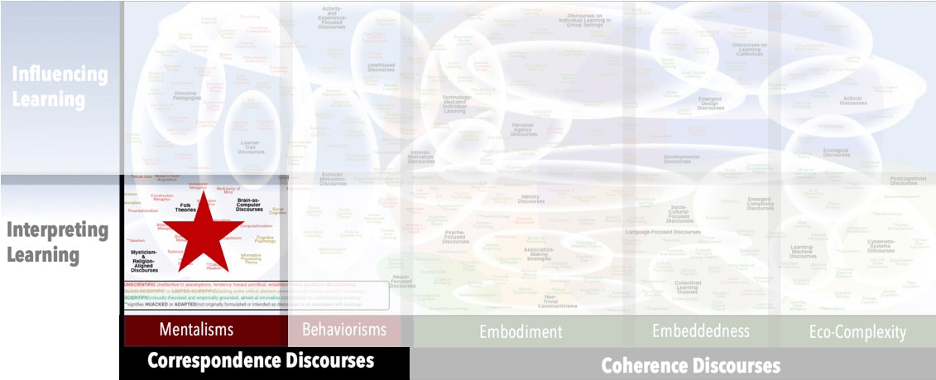Focus
Direct linkage of perception and actionPrincipal Metaphors
- Knowledge is … information
- Knowing is … using information
- Learner is … an information processor (individual)
- Learning is … coding and encoding (and associated computer-based notions, such as inputting, processing, storing, and retrieving)
- Teaching is … transmission (of information)
Originated
1990sSynopsis
Oriented by its grounding metaphor, “learning is (en)coding,” Common Coding Theory assumes that the learning/encoding of perceptions and the learning/encoding of motor actions are directly linked by a common computational code. (This notion runs counter to the assumption of most Brain-as-Computer Discourses, that perceptions and motor actions are mediated by cognitive processes.) This grounding principle entails that the perception of an action triggers the motor actions associated with the action, and vice versa. Associated constructs include:- Neural Coding – the imposition of a computer-programming metaphor onto the dynamic interactivity of neurons
Commentary
Common Coding Theory falls among Brain-as-Computer Discourses, owing to its grounding metaphor. However, whereas proponents of other entries in that cluster typically demonstrate an awareness that “brain as computer” is a figurative notion, no such awareness is evident in the literature surrounding Common Coding Theory. Quite the contrary, within the discourse, the metaphor (i.e., a descriptive device) is deployed literally (i.e., as an explanatory principle). This conceptual elision appears to be behind the tendency of proponents of Common Coding Theory to liken the perspective to such Postcognitivist Discourses as Embodied Cognition – despite the fact that those discourses explicitly reject its grounding metaphor.Authors and/or Prominent Influences
Wolfgang PrinzStatus as a Theory of Learning
Common Coding Theory is presented as a theory of learning.Status as a Theory of Teaching
Common Coding Theory is not directly or centrally concerned with matters of teaching.Status as a Scientific Theory
Proponents of Common Coding Theory claimed that the theory is supported by substantial empirical evidence. However, careful review of its cited support reveals that the discourse is attempting to piggy-back on research associated with Embodiment Discourses. That detail, coupled with the failure of proponents to identify – let alone critique – their grounding metaphor renders Common Coding Theory nonscientific in our analysis.Subdiscourses:
- Neural Coding
Map Location

Please cite this article as:
Davis, B., & Francis, K. (2022). “Common Coding Theory” in Discourses on Learning in Education. https://learningdiscourses.com.
⇦ Back to Map
⇦ Back to List
